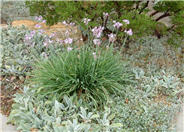
Common name:Society Garlic
Botanical name:Tulbaghia violacea
This clumping perennial will grow 1'-2' tall and has narrow, blue-green leaves. Clusters of lavender flowers bloom in spring and summer. Leaves and flowers have a distinct onion or garlic smell if crushed.

Common name:Wheeler's Dwarf Pittosporum
Botanical name:Pittosporum tobira 'Wheeler's Dwarf'
This handsome dwarf form of the Pittosporum tobira grows into a low, dense mound, 2'-3' tall and 4'-5' wide. This shrub is covered with glossy, evergreen foliage. Small, fragrant, white flowers cover this shrub in spring. It prefers full to part sun and has moderate watering needs. Wheeler's Dwarf is dependable and easy to grow. Prune in winter to keep shape.

Common name:Prostrate Rosemary
Botanical name:Rosmarinus officinalis 'Prostratus'
The 'Prostratus' grows to a height of 2'-3' with a spread to 8'. Its flowers are pale, lavender-blue in color, and the leaves are needle-like with a dark, blue-green color. This plant makes a good ground cover, and its leaves can be used as seasoning in cooking. Bloomtime is winter and spring, but also intermittently throughout the year. This ground cover like full sun and well draining soil. It is drought tolerant once it's established.

Common name:Japanese Fatsia
Botanical name:Fatsia japonica
This evergreen shrub has large, glossy, fan-like leaves that grow to 16" wide. It has a moderate growth rate to a size of 5'-8' that can be kept lower with occasional pruning. It has a very lush, tropical appearance, and grows well in partial shade.

Common name:New Zealand Flax
Botanical name:Phormium tenax
New Zealand Flax is a large, bold perennial with stiffly vertical, sword-like, green leaves that arise from its base, reaching 6'-9' tall. It should be grown under full sun for best color. Varieties will offer different growth habits and leaf color. Many varieties have reddish yellow flowers in summer but may be considered insignificant.

Common name:Pink Lady Rhaph or Indian Hawthorn
Botanical name:Rhaphiolepis indica 'Pink Lady'
This shrub will quickly grow 4'-6' tall and wide with dark green, thick foliage. It produces clusters of pink flowers that bloom in spring and clusters of black fruit in the fall. It prefers full to part sun with well draining, rich soil. 'Pink Lady" is adaptable to coastal areas as well as warm inland valleys. It has low to medium watering needs.

Common name:Pyrenees Cotoneaster
Botanical name:Cotoneaster congestus 'Likiang'
This slow growing Cotoneaster grows to about 3' tall and equally as wide and has downward-curving branches and dark green spiny foliage with the lighter undersides. Pink flowers appear in spring, followed by small red berries. This is a great ground cover around rocks and makes a good bonsai plant. This shrub does better in full sun for flower and fruit production. It is drought tolerant once it's established.

Common name:Chinese Elm, Chinese Evergreen Elm
Botanical name:Ulmus parvifolia
Chinese Elm quickly reaches 50' tall and 60' wide with an upright habit and spreading pendulous branches with age. Chinese Elm has small, dark green leaves. Foliage turns yellow or orange in fall. Small, greenish yellow flower appear in summer but are considered insignificant. Small light brown fruit appear in fall. Bark is brown gray but with maturity, exfoliates to reveal orange patterns.

Common name:Hollyhock
Botanical name:Alcea rosea
This plant grows 4-8' high and is particularly useful for background screening. It grows best in full sun in deep, rich, well drained soils and can produce a variety of colors of flowers.
| Designer: | Waves of Green |
Photographer: GardenSoft |
Soils and Compost:
Maintain a two to four inch layer of mulch on the soil surface to reduce weeds, infiltrate rain water, and reduce compaction.
Water Saving Tip:
Replace turf with groundcovers, trees, and shrubs. If you have areas where no one uses the grass, patches that do not grow well, or a turf area too small to water without runoff, consider replacing the turf with water-efficient landscaping.
Integrated Pest Management:
Attract, or buy beneficial insects such as ladybugs and lacewings to control pest outbreaks in your garden.
